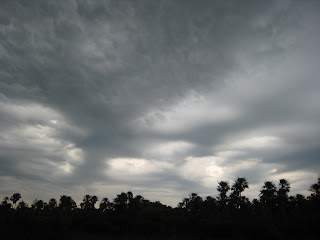This could be the quietest Latino weekend yet. You have to understand that on Fridays, Argentines head to the river, to the coast, to the campo. To light fires, cook beef, and party until Sunday evening.
We’ve decided to head for Saltos del Moncoa, a provincial park on the upper Rio Uruguay, an area of protected jungle forest. This salto or waterfall is somewhat different in that it runs along the river longitudinally, rather than across it. You need to go by boat to view it, and unlike it’s transverse cousin, is best viewed when water levels are at medium flow. Too great a flow and they become submerged.
 |
| Spookily quiet road to Saltos de Mocona |
Up to 11 o’clock this morning you could have been forgiven for wondering why it was so green. Off to the north, cloud is starting to amass, humidity is building, and we are reduced to pushing our steeds up a 1:4 hill, dripping sweat. It takes the better part of two hours to cover a relatively short distance, yet not one car has passed. It’s downright spooky. Still the clouds congregate, the atmosphere becoming heavy and oppressive. Something has to give; the question is when?
The when happens about five minutes after the tent is pitched, bags stashed in the vestibule and water on for a second breakfast. It starts slowly, only a few large wet drops of rain. The thunder starts to rumble far away, of to the north, the temperature drops and the wind picks up. It’s coming. Then it hits. Now I know why the roadside ditches are so deep, why the Rio at 1000 kilometres from the sea, is still 1km across. It’s a jungle, jungles are wet places. What doesn’t figure in this equation from the university of the blindingly obvious: where does the cold, damp wind come from?
Throughout all these atmospherically theatrics, the gregarious weaver birds: yaka-torries, carry on their noisy discussions, building their pendulous nests in a single date palm tree.
Then it goes quiet, the rain stops, the thunder stops, the wind stops, to leave only the slow drip of water from the gutterless roof onto the red wet pitted soil. That and the incessant squabling of the nest builders.
It’s now Friday afternoon and we’re still the only people on the campground, on the only campground in the park. The only road in or out is within audio distance, we haven’t heard a vehicle in the last three hours. I’m starting to question if it really is a Friday, if this waterfall really exists or is all this beauty the
figment of somebody else’s imagination. The truth lies somewhere in the latter. These saltos are suffering from big brother syndrome. The iconic touristic honey pot of Cataratas de Iguazu are not far up the road.
It’s now Friday evening, the generator is puttering somewhere of in the dark, the lights have come on. Three jungle fowl are fighting over a mate, still the nesters are squabbling, parades of moths start to congregate around the light bulbs, settling on our bags, shoulders, hands. Still we’re the only people around.
 Eight o’clock, full dark, no moon, still the only people around. It’s going to be the quietest Friday evening yet, no dogs, no cockerels, no slamming doors. That is until a pantheon of celestials take a hand. They start with a light show. Silent strobes of pale electric blue light etch out the silhouette of the forest, sudden profiles shuttering , flickering, too fast to identify. Then the distant grumble of thunder catches up, rolling around the valleys, flowing over the vegetated mesas. The coruscations come faster, the thunder thumps closer to their source. The storm Gods: Thor and his mates up the ampage, and move overhead and settle down to hurling bolts of electricity across the sky. A chaos of noise and flares. Growing bored with their pyrotechnics, they decide to add a further percussion: a tympani of rain on the drumskin of the tent. Now the lightning and the thunder come so fast, that it’s impossible to connect one flash to it’s crash. A confusion of chaos, an anarchy of noise. Slowly the clatter and the shambles settle down to one thunder flash tied to one thunder clap, that rolls like a drum roll, flowing out across the sky, seeming to wheel around and return. The volume rising and falling, growing and diminishing, finally tapering away to black silence.
Eight o’clock, full dark, no moon, still the only people around. It’s going to be the quietest Friday evening yet, no dogs, no cockerels, no slamming doors. That is until a pantheon of celestials take a hand. They start with a light show. Silent strobes of pale electric blue light etch out the silhouette of the forest, sudden profiles shuttering , flickering, too fast to identify. Then the distant grumble of thunder catches up, rolling around the valleys, flowing over the vegetated mesas. The coruscations come faster, the thunder thumps closer to their source. The storm Gods: Thor and his mates up the ampage, and move overhead and settle down to hurling bolts of electricity across the sky. A chaos of noise and flares. Growing bored with their pyrotechnics, they decide to add a further percussion: a tympani of rain on the drumskin of the tent. Now the lightning and the thunder come so fast, that it’s impossible to connect one flash to it’s crash. A confusion of chaos, an anarchy of noise. Slowly the clatter and the shambles settle down to one thunder flash tied to one thunder clap, that rolls like a drum roll, flowing out across the sky, seeming to wheel around and return. The volume rising and falling, growing and diminishing, finally tapering away to black silence.Now it’s the turn of the frogs and ciccadas to start their own symphony. The jungle by night is a noisy place.